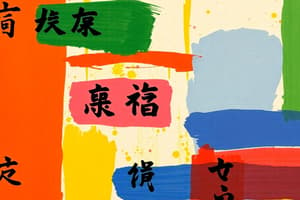Podcast
Questions and Answers
What is the Japanese word for 'breakfast'?
What is the Japanese word for 'breakfast'?
- ちゅうしょく
- ばんごはん
- あさごはん (correct)
- よるごはん
Which beverage is translated to 'コーヒー' in Japanese?
Which beverage is translated to 'コーヒー' in Japanese?
- Tea
- Coffee (correct)
- Juice
- Cocoa
How do you pronounce the Japanese term for 'fruit'?
How do you pronounce the Japanese term for 'fruit'?
- うり
- おかし
- さかな
- くだもの (correct)
What is the correct Japanese word for 'supper'?
What is the correct Japanese word for 'supper'?
What is the Japanese word for 'apple'?
What is the Japanese word for 'apple'?
How would you say 'water' in Japanese?
How would you say 'water' in Japanese?
Which of the following means 'lunch' in Japanese?
Which of the following means 'lunch' in Japanese?
What does 'おちゃ' mean?
What does 'おちゃ' mean?
How is 'banana' said in Japanese?
How is 'banana' said in Japanese?
Which Japanese phrase means 'smoothie'?
Which Japanese phrase means 'smoothie'?
What does 'おやつ' refer to in Japanese?
What does 'おやつ' refer to in Japanese?
Which of the following means 'grape' in Japanese?
Which of the following means 'grape' in Japanese?
What is the Japanese word for 'soda'?
What is the Japanese word for 'soda'?
What is the correct pronunciation for 'orange' in Japanese?
What is the correct pronunciation for 'orange' in Japanese?
Which word refers to 'sandwich' in Japanese?
Which word refers to 'sandwich' in Japanese?
Which of the following is the Japanese word for 'sour'?
Which of the following is the Japanese word for 'sour'?
What is the meaning of the Japanese word 'あたらしい'?
What is the meaning of the Japanese word 'あたらしい'?
Which term translates to 'every day' in Japanese?
Which term translates to 'every day' in Japanese?
The word 'からい' in Japanese refers to which taste?
The word 'からい' in Japanese refers to which taste?
How do you say 'tomorrow' in Japanese?
How do you say 'tomorrow' in Japanese?
What is the pronunciation for 'ブランチ' in Japanese?
What is the pronunciation for 'ブランチ' in Japanese?
Which Japanese word means 'last month'?
Which Japanese word means 'last month'?
What does 'おいしい' mean in English?
What does 'おいしい' mean in English?
How do you express 'rather interesting' in Japanese?
How do you express 'rather interesting' in Japanese?
What is the Japanese word for 'Wednesday'?
What is the Japanese word for 'Wednesday'?
Which of the following words means 'like' in Japanese?
Which of the following words means 'like' in Japanese?
How do you say 'evening' in Japanese?
How do you say 'evening' in Japanese?
What Japanese word corresponds to 'fruit'?
What Japanese word corresponds to 'fruit'?
Which of the following is the correct Japanese term for 'to sweat'?
Which of the following is the correct Japanese term for 'to sweat'?
What is the Japanese word for 'morning'?
What is the Japanese word for 'morning'?
What is the Japanese word for 'sneakers'?
What is the Japanese word for 'sneakers'?
Which of the following is the term for 'climate' in Japanese?
Which of the following is the term for 'climate' in Japanese?
What does the Japanese word 'あつい' refer to?
What does the Japanese word 'あつい' refer to?
Which Japanese word means 'rainy season'?
Which Japanese word means 'rainy season'?
What is the English translation for 'ぼうし'?
What is the English translation for 'ぼうし'?
What does 'あたたかい' mean in English?
What does 'あたたかい' mean in English?
Which term refers to 'bus' in Japanese?
Which term refers to 'bus' in Japanese?
Which of the following is the Japanese term for 'winter'?
Which of the following is the Japanese term for 'winter'?
What is the correct Japanese word for 'temperature'?
What is the correct Japanese word for 'temperature'?
Which word translates to 'jeans' in Japanese?
Which word translates to 'jeans' in Japanese?
What does the term 'あめ' mean?
What does the term 'あめ' mean?
What is the word for 'socks' in Japanese?
What is the word for 'socks' in Japanese?
Which option refers to 'cloudy weather' in Japanese?
Which option refers to 'cloudy weather' in Japanese?
What does 'きせつ' refer to?
What does 'きせつ' refer to?
Flashcards are hidden until you start studying
Study Notes
Greetings
- Japanese: Konnichiwa (こんにちは)
- Korean: Annyeonghaseyo (안녕하세요)
- Spanish: Hola
Countries
- The text includes information on Japan, Korea, and Mexico
Languages
- The text covers Japanese, Korean, German, English, and Spanish.
School
- The text includes the Japanese words for school: gakkou (学校) and daigaku (大学).
Family Terms
- The text includes family terms in both English and Japanese.
- The text highlights differences between referring to one's own family members and other people's family members.
Occupations
- The text includes a list of common occupations with English and Japanese translations.
Body
- The text provides a comprehensive list of body parts in English and Japanese.
Body Adjectives
- The text includes a list of adjectives describing physical characteristics in English and Japanese.
Location
- The text includes prepositions of place and directional words in Japanese and English.
Hobbies & Sports
- The text includes common hobbies, activities, and sports in both English and Japanese.
Food and Beverages
- The text lists common food and beverages in both English and Japanese.
- The text also includes adjectives commonly used to describe food based on taste.
Academic Subjects
- The text lists common academic subjects in Japan and English, including:
- Accounting
- Biology
- Chemistry
- Computer Science
- Economics
- Engineering
- English
- Finance
- Foreign Language
- History
- International Business
- International Relations
- Japanese
- Japanese Culture
- Law
- Literature
- Philosophy
- Politics
- Psychology
Home
- The text lists common rooms and appliances found in a Japanese home.
Pronunciation
- The text includes the pronunciation of Japanese words, provided in romanized Japanese using katakana.
Basic Japanese Vocabulary
- Cold is tsumetai, samui or hiyashi
- Hot is atsui
- Lukewarm is nurui
- Sour is suppai
- Delicious/Tasty is oishii
- Not tasty is mazui
- Sweet is amai
- Spicy/Hot/Salty is karai
- Soft is yawarakai
- New/Fresh is atarashii or shinsenna
- Old is furui
- Warm is atatakai
Time Expressions
- Monday is getsuyoobi
- Tuesday is kayoobi
- Wednesday is suiyoobi
- Thursday is mokuyoobi
- Friday is kinyoobi
- Saturday is doyoobi
- Sunday is nichiyoobi
- This week is konshuu
- Next week is raishu
- Last week is senshu
- This month is kongetu
- Next month is raigetu
- Last Month is sengetsu
- This year is kotoshi
- Next year is rainen
- Last year is kyonen
- Today is kyoo
- Tomorrow is ashita
- Yesterday is kinoo
- The day before yesterday is ototoi
- The day after tomorrow is asatte
- Morning is asa
- Morning (in the morning)* is gozen
- Morning (this morning)* is kesa
- Afternoon/Daytime/Noon is hiru/hirunma
- Evening is yuu/ban
- Night is yoru/ban
- What day of the week is nan'yoobi
Frequency Expressions
- All the time/Always is itsumo
- Often/Frequently/A lot is yoku
- Usually is taitei
- Sometimes is tokidoki
- Once in a while is tamani
- Hardly/Almost never is hotondo
- Not very often is amari (with negative)
- Not at all is zenzen (with negative)
- Every morning is maiasa
- Every night is maiban
- Every day is mainichi
- Every week is maishuu
- Every month is maitsuki
- Every year is maitoshi/mainen
- Every time/Every time is maikai/maido
- ~Times (counter for occurance) is ~kai/~do
Adverbs to Express Extent
- Very (modifies adj and adv, not verb) is totemo
- To some extent is kanari
- So-so is maamaa
- A Little is sukoshi
- Not so much (with negative) is amari
- Not at all (with negative) is zenzen
Clothing and Colors
- Blouse is *burausu
- Bra is b(r)a or chi
Weather, Seasons, and Climates
- Airplane is hikooki
Transportation
- Airplane is hikooki
Japanese Clothing
- Brassiere: ブラジャー (burajaa)
- Casual Wear: ふだんぎ (hudangi)
- Glasses: めがね (megane)
- Hat/Cap: ぼうし (booshi)
- High Heel: ハイヒール (haihiiru)
- Jacket: ジャケット (jaketto)
- Japanese-style Clothes: きもの (kimono)
- Jeans: ジーンズ/ジーパン (jiinzu/jiipann)
- Men's Suit: せびろ (sebiro)
- Necktie: ネクタイ (nekutai)
- One Piece: ワンピース (wanpiisu)
- Overcoat: オーバー/コート (oobaa/kooto)
- Pajamas: パジャマ (pajama)
- Panty / Panties: パンティ (panti)
- Pants / Briefs: パンツ (pantsu)
- Sandal: サンダル (sandaru)
- Shirt: シャツ (shatsu)
- Shoes: くつ (kutsu)
- Skirt: スカート (sukaato)
- Sneakers: スニーカー (suniikaa)
- Socks: くつした/ソックス (kutsushita/sokkusu)
- Stockings: ストッキング (sutokkingu)
- Suit: スーツ (suutsu)
- Sweater: セーター (seetaa)
- Trousers / Dress Pants: ズボン (zubon)
- T-shirt: ティーシャツ (tii shatsu)
- Underwear: したぎ (shitagi)
- Watch: とけい (tokei)
- Western-style Clothes: ふく/ようふく (fuku/yoofuku)
Japanese Weather
- Clear Weather: はれ (hare)
- Cloudy Weather: くもり (kumori)
- Cold (Weather): さむい (samui)
- Cool: すずしい (suzushii)
- Fall: あき (aki)
- Good: いい (ii)
- Hot: あつい (atsui)
- Hot and Humid: むしあつい (mushi atsui)
- Humidity: しつど (shitsudo)
- Low: ひくい (hikui)
- Mild: おだやかな (odayakana)
- Rain: あめ (ame)
- Rainy Season: つゆ (tsuyu)
- Season: きせつ (kisetsu)
- Snow: ゆき (yuki)
- Spring: はる (haru)
- Storm: あらし (arashi)
- Summer: なつ (natsu)
- Temperature: きおん (kion)
- Thunder: かみなり (kaminari)
- Typhoon: たいふう (taifuu)
- Unpleasant: いやな (iyana)
- Warm: あたたかい (atatakai)
- Weather: てんき (tenki)
- Weather Forecast: てんきよほう (tenki yohoo)
- Wind: かぜ (kaze)
- Winter: ふゆ (fuyu)
Japanese Transportation
- Automatic Ticket: けんばいき (kenbaiki)
- Bicycle: じてんしゃ (jitensha)
- Boarding Place: のりば (noriba)
- Bullet Train: しんかんせん (shinkansen)
- Bus: バス (basu)
- Car: くるま (kuruma)
- Destination: いきさき (ikisaki)
- Direct Flight: ちょっこうびん (chokkoobin)
- Express: きゅうこう (kyuu koo)
- Information Desk: あんないしょ (annai sho)
- Limited Express: とっきゅう (tokkyuu)
- Local: かくえきていしゃ (kakuekiteisha)
- Motor Bike: バイク (baiku)
- No.__ Car: 〜ごうしゃ (~goosha)
- Package Tour: ツアー (tsuaa)
- Platform No.__: ~ばんせん (~ban sen)
- Round Trip: おうふく (oohuku)
- Ship/Boat: ふね (hune)
- Sightseeing Bus: かんこうバス (kankoo basu)
- Sleeping Car: しんだいしゃ (shindaisha)
- Subway: ちかてつ (chikatetsu)
- Taxi: タクシー (takushii)
- Ticket: きっぷ/じょうしゃけん (kippu/jooshaken)
- Ticketing Window: きっぷうりば (kippu uriba)
- Time Schedule: じこくひょう (jikokuhyoo)
- Train: でんしゃ (densha)
- Transfer: のりかえ (norikae)
- Transportation: 〜いき (~iki)
- Vending Machine: 自動販売機 (jidou hanbai ki)
Japanese Four Seasons
- Four Seasons: しき (shiki)
Studying That Suits You
Use AI to generate personalized quizzes and flashcards to suit your learning preferences.




